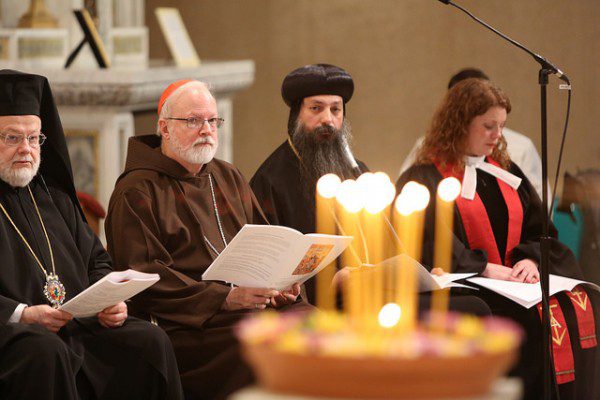More from Kenneth L. Woodward’s Getting Religion: Faith, Culture, and Politics from the Age of Eisenhower to the Era of Obama. . . .
Movements take place outside of denominations, so one legacy of the dominance of “movement religions” over “embedded religions” is the erosion of denominational distinctives. There is thus a new ecumenism among both liberal and conservative churches.
In contemporary Christianity, liberals have their ecumenical movement; conservatives have their para-church organizations. Both of which minimize the differences between theologies and denominations, creating a least-common-denominator, de facto type of Christian unity.
There are other areas in which conservatives “both countered and paralleled” the liberals (p. 141). Both invested heavily in politics. The liberal churches have been promoting liberal and leftwing politics. (See the mainline denominations’ convention resolutions.) The conservative churches have been promoting conservative and rightwing politics. (And getting criticized for it by people oblivious to how the liberal churches have become far more politicized and were doing it long before there was anything like a “Christian right.”)
Woodward observes that while the Baptists exercise an outsized influence on the Republican party, Methodists exercise an outsized influence on the Democratic party. Social justice Methodists include Democratic presidential candidates George McGovern, Walter Mondale, and Hillary Clinton. Woodward further points out how the tone of “moral righteousness” associated with Methodism animates the rhetoric of Democrats.
So where does the Lutheran Church Missouri Synod fit into this analysis? The LCMS is a major outlier, a holdout of “denominationalism.” In the LCMS, denominational distinctives are important. The LCMS shows no interest in “unionism” of either the ecumenical liberal variety or the para-church conservative variety.
Yes, the LCMS has been affected by the religious movements. In fact, unlike other denominations, the LCMS has had to deal with movements of both the liberals (ecumenism, higher criticism, feminism) and the conservatives (evangelicalism, the charismatic movement, the church growth movement). And while some in the LCMS have been swept up in these various causes, the denomination as a whole has lurched back towards confessional orthodoxy time and time again.
No wonder confessional Lutherans are culturally out of synch. No wonder people are so outraged at LCMS practices such as “closed communion,” which go against the assumption on all sides that all churches are basically the same and that all Christians are unified. (Yes, Lutherans believe that everyone with faith in Christ is unified in Him as part of God’s spiritual kingdom. But they don’t gloss over the differences in theological confessions and institutional identity.)
But the LCMS is a relic of the “embedded religions” that keeps alive important elements of traditional Christianity. “Movement religions” can be valuable, Woodward says, but at the cost of providing stability, meaning, and identity, all of which have religious importance. Today many of the movements are being discredited by a secularist culture. Rod Dreher’s “Benedict Option” (another book I hope to review and discuss at this blog) seems to be calling for a return to “embeddedness.” That may be easier for Missouri Synod Lutherans.
Or maybe Lutheranism will turn into a “movement” as it was 500 years ago.
Photo: Ecumenical prayer for all martyrs, Boston, 25 January 2014, by George Martell/The Pilot Media Group, Flickr, Creative Commons License.














